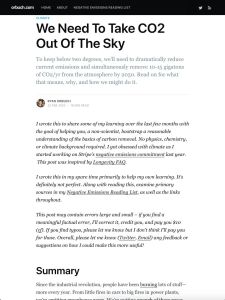Join getAbstract to access the summary!

Join getAbstract to access the summary!
Ryan Orbuch
We Need To Take CO2 Out Of The Sky
To keep below two degrees, we’ll need to dramatically reduce current emissions and simultaneously remove 10-15 gigatons of CO2/yr from the atmosphere by 2050. Read on for what that means, why, and how we might do it.
Ryan Orbuch, 2020
What's inside?
Meeting 2°C [3.6 °F] global warming minimum requires reducing CO2 emissions, and removing gigatons of CO2 from the sky.
Recommendation
Scientists continue to debate methods of limiting the Earth’s atmospheric temperature increase to a minimum of 2°C [3.6 °F] by 2050, the Paris Agreement’s proposed acceptable level. But researcher Ryan Orbuch insists that simply reducing current greenhouse gas emissions will never go far enough, even if all countries work toward that goal. Humans must additionally remove up to 15 gigatons of CO2 from the sky per year. To achieve this, employing negative emissions technologies (NETs) will be key.
Summary
About the Author
Ryan Orbuch is a climate research associate at Stripe, a company that builds economic infrastructure for the internet. Stripe strongly supports negative emissions technology.











Comment on this summary